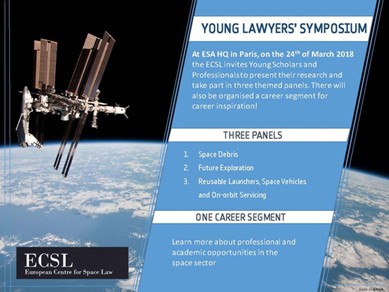Irina Chernykh, PhD student of the International Law Department (RUDN University) became a participant of Young Lawyers' Symposium (YLS)

On the
On the 23 of March, European Center for Space Law held the Scientific and Practical Forum on Topical Issues of Space Law and Policy. Theorists and practitioners working in all fields of the space sector took part in it. Theme of the Forum in 2018: “Questions of cyber attacks in space: legal solutions”, within the framework of which two sections were held: “Cyber-attacks and international law” and “A look into the future: how to identify the threats of cyber attacks in the field of space activities?”.
The European Centre for Space Law (ECSL) brought together young scholars and professionals to take part in the third edition of the Young Lawyers’ Symposium (YLS), which had been organised on the 24 of March 2018 at ESA Head Quarter in Paris.The aim of the Young Lawyers’ Symposium was to allow for early career scholars and professionals to present on a space law related topic in an international forum, exchange ideas and network amongst themselves.The Young Lawyers’ Symposium 2018 centred around three themed sections, considered legal aspect relating to: Space debris“, “Reusable launchers, spacecraft and maintenance in orbit”, “Future use of outer space”.
Such well-known scientists of international space law as S. Markisio, Professor Frans von der Dunk (Director Public Relations of the International Institute of Space Law (IISL), Member of the Board of the European Centre for Space Law (ECSL), and Member for the Netherlands in the International Law Association’s (ILA) Committee on Space Law; M. Rossini, S. Moise, Christian Brünner (since 1980 is Full Professor at the Department for Austrian, European and Comparative Public Law, Political Sciences and Public Administration, University of Graz. He founded in 2001 the National Point of Contact (NPOC) in Austria of the European Center for Space Law (ECSL) and many others took part in the work of the Forum and the Symposium. Besides, representatives NATO, ESA and other enterprises in the field of security.
Matilda Pavlovna Mityaeva was born in 1925. In November 1942, she volunteered for frontline duty. She participated in the Great Patriotic War from November 1942 to June 1945 as part of the 53rd Infantry Division of the 475th Infantry Regiment. She was wounded twice.
The team led by Sergey Zyryanov, Head of the Department of General and Clinical Pharmacology, became the winner of the All-Russian competition of scientific projects "Technologies for Human Health".
RUDN University constantly adapts to the changes of the modern world and responds to challenges flexibly. This allows us to keep the standard of a world-class research university. The sphere of science is no exception. Peter Dokukin, Head of the Research Division, presented the updated R&D Programme at the meeting of the RUDN University Academic Council.
Matilda Pavlovna Mityaeva was born in 1925. In November 1942, she volunteered for frontline duty. She participated in the Great Patriotic War from November 1942 to June 1945 as part of the 53rd Infantry Division of the 475th Infantry Regiment. She was wounded twice.
The team led by Sergey Zyryanov, Head of the Department of General and Clinical Pharmacology, became the winner of the All-Russian competition of scientific projects "Technologies for Human Health".
RUDN University constantly adapts to the changes of the modern world and responds to challenges flexibly. This allows us to keep the standard of a world-class research university. The sphere of science is no exception. Peter Dokukin, Head of the Research Division, presented the updated R&D Programme at the meeting of the RUDN University Academic Council.